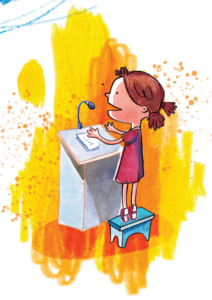“(…) The more stakeholders that are aware, and the more agencies that are aware of the applicable human rights framework, as well as the legal and practical challenges faced by children when taking on human rights advocacy, the more attraction and acceptance there will eventually be, and this will grow.” Ms Mary Lawlor, Special Rapporteur on Human Rights Defenders
- Access the flyer here.
- Access the concept note here.
- Access the briefing summary here
- Read the full speeches and video recordings here – coming soon
A briefing on Child Human Rights Defenders (CHRDs) and the Universal Periodic Review (UPR) took place on 5 September 2022 from 13:30 to 14:30 CET at the Child Rights Connect office and on Zoom, among Member States and civil society. Panellists stressed that it is time for UPR recommendations specific to child human rights defenders (CHRDs), to ensure their recognition, protection and empowerment at the national level.
Elvira and Gheorghe, young human rights defenders who started campaigning for human rights in Moldova at the age of 13, highlighted: “We are encountering a number of difficulties. One of the most important one is the fact that we are not taken seriously by teachers, by local public administration as well as national government. And sometimes even the international organisations don’t take us into consideration seriously, such as in the process of UPR.” They called for UN Member States to recognise children as human rights defenders and to meet with child human rights defenders to hear their concerns and recommendations.
The Special Rapporteur on Human Rights Defenders, Ms Mary Lawlor, reinforced their messages by highlighting that children are at the forefront of raising awareness about climate change and environmental degradation, bullying at school and many others. At the same time, children are disenfranchised and often excluded from public and political life. Ms Lawlor emphasised the need to strengthen children’s agency, self-esteem and knowledge so that they can participate in the public decision-making process. Ms Lawlor highlighted that UPR recommendations are not sufficient when it comes to child human rights defenders, because even if they are formulated in a general and all-encompassing way, they usually have adult human rights defenders in mind, not children. In relation to her office and the broader UN human rights system, Ms Lawlor made a call that “(…) the stakeholders and the networks working on a child human rights defenders need to put more effort into making sure the cases are submitted with the relevant mechanism so that communications can be issued and specific recommendations can be generated.”
Additionally, Ms Mikiko Otani, the Chairperson of the UN Committee on the Rights of the Child, highlighted key reasons why the terminology of ‘child human rights defenders’ must be used, despite some scepticism that it might be dangerous and put children at more risk. Ms Otani stressed that “(…) children are already human rights defenders, and they have the same rights as adult human rights defenders (…) we need to highlight their important role, and the obligation of States to respect and protect their rights (…)”. Ms Otani reflected on the situation of CHRDs, highlighting that “children are very often denied their civil and political rights and are very often under more restrictions because they are children (…) they are more likely to face violence but are not accessing the protection of governments (…)”.
And as Eamonn Mac Aodha, Chargé d’Affaires of the Permanent Mission of Ireland said: “(…) the recognition of individuals as child human rights defenders is essential to ensure that they are afforded the legal protections (…).” States and governments have a duty to protect children because they are denied the exercise of their rights. They can take example of Ireland that has a national framework that aims to ensure that children are provided with safe and inclusive opportunities to form and express their views, that the expression of their views is facilitated and that their views are heard and considered. This empowers CHRDs in all areas of public decision-making.

In addition, Fernando Espinosa, the Deputy Permanent Representative of the Permanent Mission of Mexico, informed: “The protection of promotion of human rights, particularly of human rights of children and human rights defenders, is one of Mexico’s main foreign policy priorities in terms of human rights.” Mr Espinosa also stressed the importance of comprehensive laws on human rights defenders, which must be adopted through a “participatory and inclusive process”. Mr Espinosa stressed the importance of a clear definition at the national level of CHRDs, as often they are excluded which can undermine national efforts to implement UPR recommendations inclusively.
Petcharat Saksirivetkul, the Campaign Manager of Amnesty Thailand, added that a bigger step needs to be taken and attention drawn to the recognition and uniqueness of the child. Recognition is important for civil society like Amnesty and other local organisations to translate the country’s promises into action. The UPR recommendations must also have “specific reference to children and child human rights defenders”. Ms Saksirivetkul concluded by saying: “We hope that (…) with cycle four, we will see the intersectionality of all rights of the child, the complexity of the child and finally be able to put human rights protection mechanisms in place and in practice (…)”.
Last but not least, Laura Sinner, Programme Officer at UPR info, argued: “(…) there is a huge lack of child friendly information on human rights mechanisms in general and the UPR is no exception (…)”. Ms Sinner shared the ‘UPR & Me’ Guide for children as a tool to empower CHRDs to engage in the UPR process. Laura also highlighted that the UPR is the only mechanism that covers all human rights and therefore offers the possibility to raise new issues.
Please read our briefing on CHRDs in the UPR which was launched at this event, and share widely among your networks. Feel free to get in touch with Emma for any questions.



